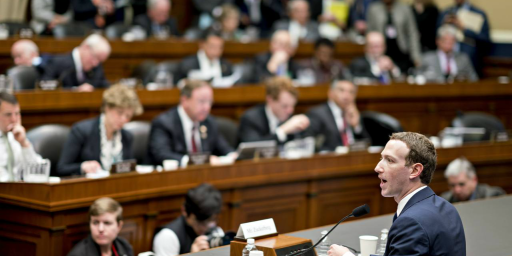Your Facebook Chats Are Being Monitored, By Facebook
Mashable is out with a report that Facebook routinely monitors user chats for suspicious or criminal activity:
Facebook and other social platforms are watching users’ chats for criminal activity and notifying police if any suspicious behavior is detected, according to a report.
The screening process begins with scanning software that monitors chats for words or phrases that signal something might be amiss, such as an exchange of personal information or vulgar language.
The software pays more attention to chats between users who don’t already have a well-established connection on the site and whose profile data indicate something may be wrong, such as a wide age gap. The scanning program is also “smart” — it’s taught to keep an eye out for certain phrases found in the previously obtained chat records from criminals including sexual predators.
If the scanning software flags a suspicious chat exchange, it notifies Facebook security employees, who can then determine if police should be notified.
Keeping most of the scanned chats out of the eyes of Facebook employees may help Facebook deflect criticism from privacy advocates, but whether the scanned chats are deleted or stored permanently is yet unknown.
The news was first broken in a Reuters story that describes one incident in which the software did in fact catch a child predator:
(Reuters) – On March 9 of this year, a piece of Facebook software spotted something suspicious.
A man in his early thirties was chatting about sex with a 13-year-old South Florida girl and planned to meet her after middle-school classes the next day.
Facebook’s extensive but little-discussed technology for scanning postings and chats for criminal activity automatically flagged the conversation for employees, who read it and quickly called police.
Officers took control of the teenager’s computer and arrested the man the next day, said Special Agent Supervisor Jeffrey Duncan of the Florida Department of Law Enforcement. The alleged predator has pleaded not guilty to multiple charges of soliciting a minor.
“The manner and speed with which they contacted us gave us the ability to respond as soon as possible,” said Duncan, one of a half-dozen law enforcement officials interviewed who praised Facebook for triggering inquiries.
Facebook is among the many companies that are embracing a combination of new technologies and human monitoring to thwart sex predators. Such efforts generally start with automated screening for inappropriate language and exchanges of personal information, and extend to using the records of convicted pedophiles’ online chats to teach the software what to seek out.
As it turns out, this is all covered in the company’s Privacy Policies:
“We may disclose information pursuant to subpoenas, court orders, or other requests (including criminal and civil matters) if we have a good faith belief that the response is required by law. This may include respecting requests from jurisdictions outside of the United States where we have a good faith belief that the response is required by law under the local laws in that jurisdiction, apply to users from that jurisdiction, and are consistent with generally accepted international standards.
“We may also share information when we have a good faith belief it is necessary to prevent fraud or other illegal activity, to prevent imminent bodily harm, or to protect ourselves and you from people violating our Statement of Rights and Responsibilities. This may include sharing information with other companies, lawyers, courts or other government entities.”
It’s hard to argue with what Facebook is doing here. Yes, there are some privacy concerns here, but Facebook is a private company and free to set its own policies on these issues. Additionally, it has a corporate brand to protect, not to mention the potential of liability, from being known as a place where parents can’t be sure that their teenager children can be safe. Of course, one should also point out that parents should probably be more vigilant about keeping an eye on what their kids are doing online, especially when it is so easy for them to manipulate Facebook’s settings to make it appear like they are older than they actually are.







At this point, there’s really no reason for Facebook users to expect any privacy. Which is one of many reasons I don’t use it.
That privacy policy doesn’t say anything about monitoring correspondence. All it says is that it will share information and respond to subpoenas. I don’t think you could reasonably construe that privacy policy to say “we’re monitoring everything you’re doing and saying.”
Reality is that they have a transaction record of every message and they have it stored and available – ‘monitoring’ is probably reporting on key words – I think there’s more than enough evidence that they’re entirely good with passing this data along.
I know many young people who have significantly cut back their use of Facebook – they felt that they were ceding too much of their privacy to Facebook.
My youngest daughter (mid-twenties) says that Microsoft is the Evil Empire, Apple is a Cult, and Facebook makes life difficult.
Ah, the joys of having never joined Facebook!